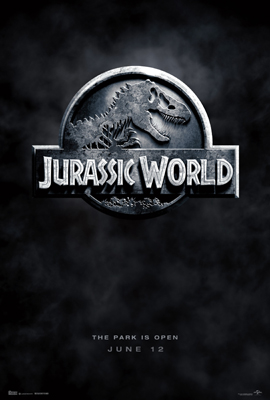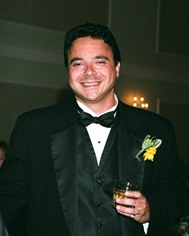 “Jurassic World” misses an opportunity to be better than what Michael Crichton envisioned when he wrote his novel “Jurassic Park,” a terror ride through a theme park where genetically-created dinosaurs run amok attacking the very tourists who came to see them. What “World” could and should have been is a scathing satire and indictment of the corporate greed that gives people what they want regardless of safety- what it does instead is narrow its vision and settle for being just another standard B-monster movie sequel.
“Jurassic World” misses an opportunity to be better than what Michael Crichton envisioned when he wrote his novel “Jurassic Park,” a terror ride through a theme park where genetically-created dinosaurs run amok attacking the very tourists who came to see them. What “World” could and should have been is a scathing satire and indictment of the corporate greed that gives people what they want regardless of safety- what it does instead is narrow its vision and settle for being just another standard B-monster movie sequel.
The genesis for “Jurassic Park” began with 1973’s film “Westworld” (written and directed by Crichton) that allowed adults to live out their fantasies in a theme park called Delos. While Delos consisted of three worlds (Medieval World, Roman World and Western World), Crichton followed two men (Richard Benjamin and James Brolin) who buy tickets to Westworld to live out their fantasy of gunfights and barroom brawls in an Old West setting inhabited by western-themed robots. The human guests are provided guns to shoot the robots- the guns fashioned with a heat sensor to ensure they only shoot and kill cold-metal robots, not any warm-blooded fellow guests. That all changes when a virus runs through Delos affecting the robots and making them behave badly. When one of the gunslinger-model robots (Yul Brynner) actually kills a human guest in a showdown, the other guests of Delos scamper for safety, obviously not happy with the threat of murderous, malfunctioning robots- it’s not what they paid for.
In 1993’s “Jurassic Park,” we got what we paid for: Crichton’s similar storyline idea was given Steven Spielberg’s magic touch. We had fun watching “Park’s” idea for a dinosaur-themed amusement park go awry in seeing genetically-created dinosaurs revolt in being brought back from extinction to play in a world natural selection had denied them. The lesson of learning not to fool with Mother Nature was evident when these dinosaurs started to run amok to attack their creators and the people they were brought back to entertain. While this entertained us as a movie audience, “World” only maintains that entertainment and misses the better satire inherent in indicting the corporate greed of theme parks that place wild animals in captivity for our amusement without regard for the safety of everyone and everything involved.
“World’s” story begins by showing us corporate greed has indeed won out: the dinosaur-friendly theme park envisioned by Jurassic Park’s creator John Hammond (Richard Attenborough) has come to fruition on the very site of the tragedy twenty-two years earlier. More species of dinosaurs have been created and thousands of tourists flock to Isla Nublar to see these dinosaurs; the corporations were right- dinosaurs equal dollars. To pique audience interest in the decade-old park when attendance numbers decline, new species are genetically-manufactured to serve as new attractions; as referenced in “World,” even stegosauruses begin to have the novelty of elephants in a zoo over time. So is created a new attraction- Indominus Rex, a T Rex genetically-mixed with another species whose identity is withheld as classified information.
Claire (Bryce Dallas Howard) runs the operations of Jurassic World and is visited by her nephews, Gray (Ty Simpkins) and Zach (Nick Robinson). While the boys are escorted through the theme park, Owen (Chris Pratt) is called in to assess Indominus Rex, the newly-designed dinosaur still being held in a containment tank. Owen’s value and input is invaluable to the park- his ex-Navy training and handling of four velociraptors (cutely named Blue, Charlie, Delta, and Echo) prove that he can train dinosaurs by acting as the Alpha male. While Owen’s training of these velociraptors has piqued the interest of Hoskins (Vincent D’Onofrio), who has plans for the use of velociraptors as military soldiers to fight enemies in the near future, Owen discovers I. Rex may have escaped, as evidenced by the large claw scratches along the height of its containment wall and heat sensors that cannot detect the dinosaur. Owen enters the tank with two other men to investigate only to discover I. Rex is very much there- its genetic makeup has given it the ability to camouflage as well as cool its body to avoid heat sensor detection. Needless to say, I. Rex breaks out and the hunt begins to destroy it before it reaches the now locked-down theme park. As Claire’s nephews are outside the boundary of the theme park when this lockdown begins, Owen and Claire must embark on a search-and-rescue mission to save the boys while the hunt for the deadly I. Rex ensues.
While “World” gives us different species of dinosaurs acting like rock-‘em sock-‘em robots and us enjoying the question of ‘who would win in a fight,’ it misses the satirical angle of corporate greed over theme-park safety. Case in point- “World” has a Sea World-like attraction featuring Mosasaurus, a whale-sized carnivore held in a containment pool that jumps to feed on wire-suspended sharks that douses its spectators in the surrounding grandstand with the splash of its wake. If you’ve seen the documentary “Blackfish” and the inherent cruelty in keeping killer whales in captivity that forces them to begin to attack their trainers, you know what I’m talking about. Instead, “World” is content to introduce new species of dinosaurs to have them be marketable: I’m sure Owen’s velociraptors are on the sides of 7 Eleven Slurpee cups as we speak. Who’d you get, Charlie? Order another Slurpee and try to get Blue’s cup- collect all four!
“World” will undoubtedly make a gazillion dollars at the box office- I’m not mathematician, but I just shelled out $17 to see dinosaurs duke it out in 3D and my theater was sold out. Sequels will also undoubtedly follow, probably featuring the velociraptors-as-military soldiers angle hinted at in “World” that will make the sequel look a lot like James Cameron’s “Aliens.” If dinosaurs running amok are what you want to see, Universal Studios is happy to provide that entertainment if you’re paying. For a check-your-brain-at-the-door summer movie experience, “World” succeeds. While I wanted more of the satirical bite in the inherent pitfalls of corporate greed, marketing and consumerism, I fell victim to the very example I wanted “World” to lampoon. Because this sequel refuses to bite the hand that feeds it, its narrow scope made my view of “World” smaller than it should have been.
